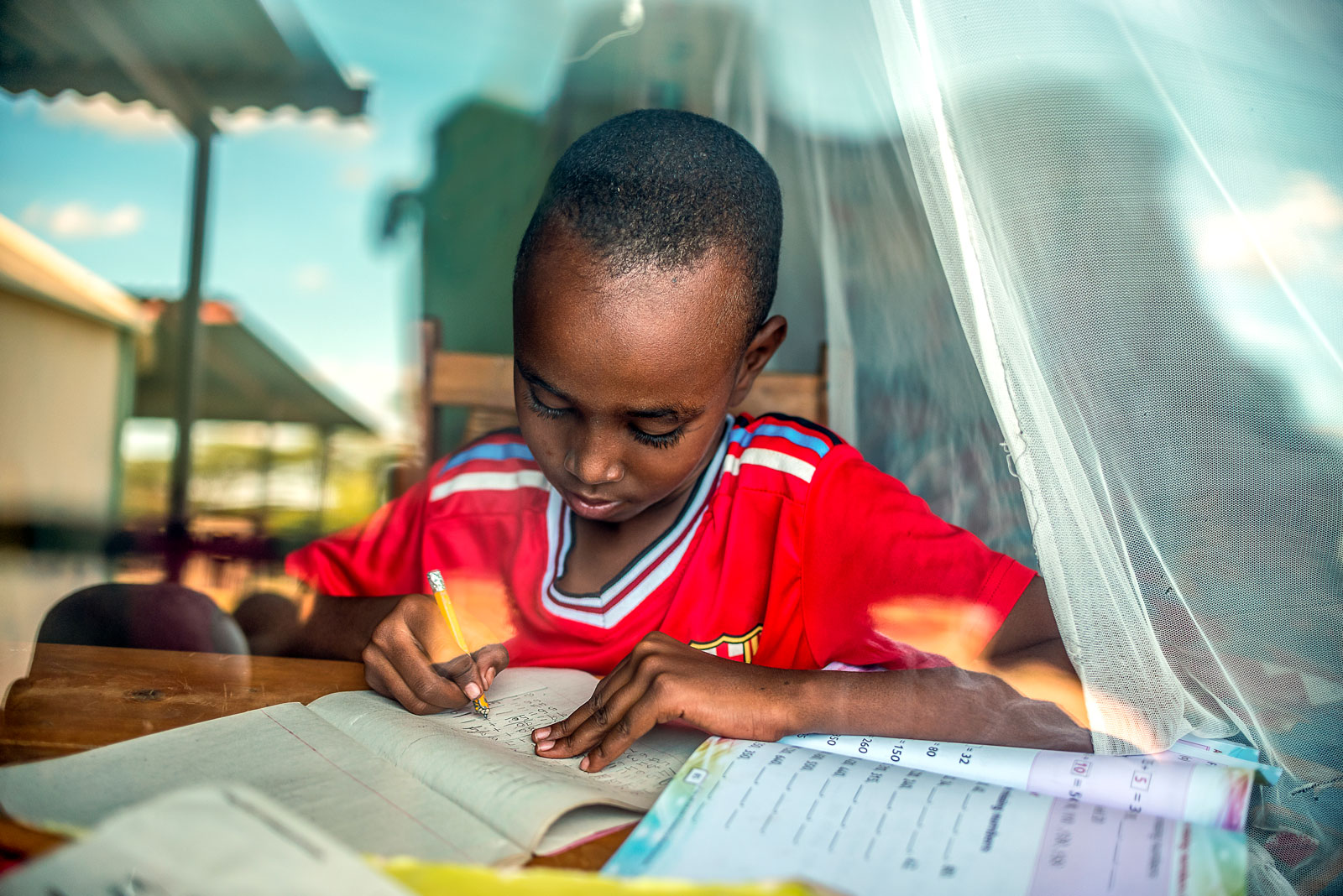It doesn’t matter where you live: teachers love to give out homework! Check out where these children study to improve their education.
22 Jan, 2019

Maindi does homework in her mud hut
Maindi Buroya is 8 years old and has been going to the local Compassion centre since 2015. She is in year one and is the only child in her family who goes to school.
Maindi, her four siblings and their parents live in a tiny one roomed hut. Their home is made of mud mixed with dung and sticks; layered animal hide and thatched grass keep the rain from penetrating the walls. With no electricity and only a kerosene lamp available, Maindi hurriedly completes her homework before night falls and the rest of the family return so she can concentrate.

Leonardo does homework on a handmade desk
10-year-old Leonardo lives in North Sulawesi Indonesia. Leonardo prefers reading and writing as subjects. "Math is too hard to complete," he says.
Leonardo’s village is nearby a beach, which means that the community experiences power failures as a result of strong winds. Leonardo and his school mates will complete their homework as soon as they get home from school, particularly in the rainy season as the lights may not turn on when it’s dark.

Tracy does homework at her grandma’s fruit shop
Tracy Nabwire is 8 years old and in year three at school. Tracy lives with her grandmother who runs a grocery shop in Kawangware slums, Nairobi.
Every day after school, Tracy sits in the shop and does her homework while selling to the numerous customers who frequent their kiosk—the ultimate multi-tasker.
“I love to help my grandmother at the shop. It helps me to know how to talk to people and to practice mathematics [when] working out the change to give,” says Tracy.

These Thai friends do their homework together
Many children find that doing things together is better. These friends from Thailand motivate one another to take responsibility of their education as they dream of the future.
The room may be small, and the lighting is dim, but these children know that if they work hard and study, the cycle of poverty will end with them.

Mary does homework in her one-bedroom house
Mary Muthoni is 5 years old and in kindergarten. Mary lives with her single mum and four siblings in a one-bedroom house in Kawangware slums in Kenya.
Mary’s favourite subject is English and she wants to be a doctor when she grows up. Mary does her homework next to a kerosene lamp, while her mother looks after her siblings and prepares supper.

Bravin does homework by his kerosene lamp
Bravin Wandera is 9 years old. He lives with his grandmother Eunice in a single room house in the heart of Kawangware in Kenya. As electricity is too expensive, Bravin relies on a kerosene lamp to do his homework when it gets dark.

Angela, Angelica and Angelou do their homework on the floor
These three sisters from the Phillipines have big dreams.
“I strive to study well because I want to become a teacher,” says 14-year-old Angelica.
The girls all have their own way of studying—Angelica will study in the morning before school, and her two sisters would rather study in the evening after dinner. They'll study on the cement floor in a small room.

Pili does homework on her bed
Pili Asiyu is 19 years old. Pili completed her high school exams and is set to pursue a diploma in hotel management and tourism.
“I live with my mother and sister in a single room and finding time to study was difficult,” says Pili.
“While I was studying for my exams this bed became my study desk, allowing me to perform well in my examinations.”.

Sammy does homework in his bedroom
Sammy Aule is 8 years old. He’s a very bright student at the top of his class.
“I love to do my homework in my room because it is a peaceful space, and no one disturbs me here,” says Sammy.
From a fruit shop, a bed on the floor, or inside a mud hut: it doesn’t matter where children are doing their homework, it matters that they are given the opportunity and support to do it. Education is a powerful way to reduce poverty. In developing countries, 200 million young people leave school without the skills they need for gainful employment.
Sources: UNESCO
Field reporting and photos by Isaac Ogila, Piyamary Shinoda, Edwin Estioko, Vera Aurima; words by Ellyse McCallum

Education Changes Lives
Help ensure every child has access to quality education and training opportunities. Learn More
